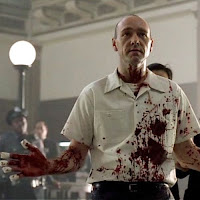Not a reference to the show, I assure you.
So, I ranted about this a while back, but a few recent things made me want to revisit it…
If I may, I’d like to go classical for a moment and talk about Jane Eyre. Yes, the 1847 book by Charlotte Bronte a.k.a. Currer Bell, sister of Emily and Anne. Now, Jane Eyre was one of Bronte’s earlier books, so we can excuse some of the clumsiness in it (her Villette isn’t as well known, but it’s a much smoother, subtler book). There’s one thing in it we can’t forgive though, and that’s Charlotte falling back on a cop-out character to drive several huge events in her story.
I’m speaking about Bertha Rochester, the crazy wife in the attic. She gets loose every now and then from her attic prison and glares at Jane. She’ll just stand in Jane’s bedroom and stare at her while she’s sleeping. Sometimes she does it from windows when Jane is outside. It gets so disturbing it drives a wedge between Jane and her beloved Edward “Mr.” Rochester (Bertha’s husband) and sends her fleeing. We eventually discover that Bertha sets fire to Rochester Hall (off-camera, so to speak) and throws herself from the roof during the blaze, thus clearing the way for Jane and Edward to be married at the end of the novel.
Now, it’s never made clear what drove Bertha insane. We also don’t learn exactly why she feels the need to glare at sleeping Jane from high windows and the end of her bed. Never discover why she sets fire to her home or decides to kill herself. Bertha just does all this because, well… she’s insane.
Shenanigans, my friends. I call shenanigans.
If you skim through that list of keywords on the side, you’ll see several rants about characters and a few on motivation. They’re related, after all. Believable characters are what make a story come to life, and good motivations are part of what make characters come to life.
One thing many people have trouble with are the bad guys in their stories. We all tend to use little bits of ourselves in our characters, but of course few of us have lots of criminal experience and none of us (hopefully) have homicidal impulses. It can be tough to get inside an antagonist’s head and come up with a rationale for whatever they’re doing.
Not only that, but sometimes certain events or moments just have to happen in a story. It’s been all plotted out and we need a reason for the characters to do this so that and that can happen a bit later. The writer also knows they need an in-story motivation for these events, no matter how bizarre or unlikely they are.
Faced with these challenges, a lot of people fall back on the quickest, easiest solution they can. They say the character is insane.
Now they don’t need a motivation, right? He or she is just doing this stuff because, well… they’re insane.
This is pretty much hands-down the laziest writing someone can ever do. All characters need a solid motivation, and when a writer decides to use insanity as carte blanche for any actions or behaviors of a character, it just shows that he or she was too lazy to work out a real motivation. The plot needs to be driven forward, and there’s no logical reason for this to happen, so we’ll just say someone’s insane and relieve ourselves of the need to be logical. It’s a cheap way to hide the writer’s button-pushing.
Another common occurrence is for the insanity to be a twist, something that comes out of nowhere and takes the reader’s breath away. The flaw that usually goes alongside this is that once Wakko’s insanity is revealed, his behavior does a complete 180 and he begins to act like a lunatic. Yes, Wakko’s been calm and rational for the entire story, but now that we know the truth he’s started foaming at the mouth and grabbing for kitchen knives. You can’t have a rational villain and fall back on “he’s insane.” This is a major cop-out. Dan Brown took a perfectly passable techno- thriller, Digital Fortress, and killed it in the last fifty pages when one of his leads turned out to be insane. Had nothing to do with the main story, this guy just happened to be nuts and started twitching as soon as we found out.
Just to be clear, insanity in and of itself is not a bad thing (speaking from a character point of view, of course). Hannibal Lecter. Renfield. The Joker. Davros. All of these characters are unquestionably out of their skull and are pretty much across the board magnificent either in print or on the screen. The thing is, the writers behind these characters all realized the key point I’d like to make here.
Y’see, Timmy, insanity is not a motivation. It’s the lens the characters are seeing their motivation through.
There’s an old joke you’ve probably heard that one definition of insanity is repeating the same action and expecting different results. But let’s really consider that for a moment. The implication is that Wakko, our insaniac, is choosing to repeat a given action–say, dropping anvils from a great height–because it’s his belief that the logical outcome of this action will be a certain, predictable result (just not the one he’s getting). He isn’t just dropping anvils for the heck of it. He has a motive fueled by what he sees as logical expectations.
In my college novel, The Trinity, the villain is completely insane. Homicidal, in fact. He believes that God only wants blood sacrifice, preferably human. That’s why, in the Bible, he rewards Abel for sacrificing a sheep but turns his nose up at Cain’s much larger sacrifice of harvested fruits and grains. When Cain does spill blood later (Abel’s), God rewards him with a mark that says no man will ever be able to lay hands on him. Thus, my modern-day villain has determined God wants us all to kill as many people as possible. A very twisted interpretation, granted, but I did tell you this guy’s insane, right? He’s not killing people because he’s insane, mind you, he’s killing them because, through his insanity, he believes this is how he should follow God’s will. We can point at it and say he’s doing Y because he believes X and expects Z as a result.
The Joker believes he can prove that everyone, at heart, is ruthless and psychotic, just like him. Renfield believes eating insects and spiders means he’s eating their life-essence and extending his own. Hannibal Lecter isn’t bound by the standards and taboos of the human race, giving him a cold ruthlessness that makes the Joker almost look rational. The writers behind these characters didn’t just fall back on “they’re insane.” They all have actual motivations for their specific actions.
Now, just to be clear, there are times where mindless insanity is just fine. Want someone gibbering in the corner reciting the same numbers again and again? You need somebody chopping up nubile teens out at Camp Crystal Lake? The purposeless madman was made for these tasks.
It needs to be said, though, this only works on a certain level of storytelling, and it isn’t a very high level. The stories of Jason Voorhees and Michael Myers are, at their core, campfire stories. It’s that same story of the escaped madman with the hook except here he’s got a machete. And that story’s great around a bonfire (or with popcorn), but you can’t really bring any clever twists or subtle nuances into it. Which means you shouldn’t expect a larger audience to be interested in it.
That’s why Friday the 13th just gets a decent opening weekend and Silence of the Lambs gets twelve weeks in the top five and a pile of Oscars the following spring.
Next week, six years is almost up, so we need to get in one last discussion about that mysterious island.
Until then, go write.
 I’ve seen a few variations off this, and you probably have, too. Phoebe’s perfectly happy to live in everybody’s shadow… until she isn’t. Yakko’s seemed perfectly sane… until it’s revealed he’s been completely mad the entire time we’ve known him! That statue’s sat quietly in the museum since the 19th century… until sundown today, when it opened a portal to hell.
I’ve seen a few variations off this, and you probably have, too. Phoebe’s perfectly happy to live in everybody’s shadow… until she isn’t. Yakko’s seemed perfectly sane… until it’s revealed he’s been completely mad the entire time we’ve known him! That statue’s sat quietly in the museum since the 19th century… until sundown today, when it opened a portal to hell.






